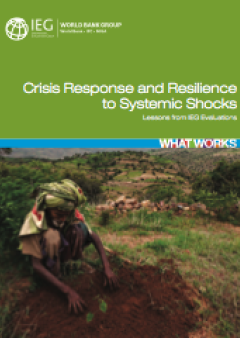
Crisis Response and Resilience to Systemic Shocks: Lessons from IEG Evaluations
The topic of resilience has gained prominence on the development agenda. Many of the Sustainable Development Goals relate to resilience.1 In the World Bank's new strategy adopted in October 2013—achieving the twin goals of eliminating extreme poverty and boosting shared prosperity in a sustainable manner—resilience is at the heart of the three-pronged view of sustainability: fiscal, social, and environmental sustainability.
This synthesis of existing evaluations seeks to draw lessons from key IEG evaluations of World Bank Group support for strengthening client country response and resilience to systemic shocks. The synthesis is concerned exclusively with systemic shocks—that is, shocks that affect highly significant numbers of economic agents in at least one country, possibly several—and the impact of which unfolds during a relatively short time.
The paper considers four families of systemic shocks: the sharp increases in food prices in 2007–08, the 2008–09 global financial crisis, natural disasters, and pandemics. It brings together findings from IEG evaluations or learning products dealing with the World Bank Group's responses to the food crisis and the global financial crisis; support for social safety nets, environmental sustainability, and climate change (to the extent that it results in more frequent and severe environmental shocks);2 the Global Facility for Disaster Risk Reduction (GFDRR); avian influenza; and engagement in small states and resource-rich countries.
